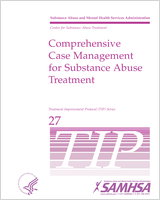NCBI Bookshelf. A service of the National Library of Medicine, National Institutes of Health.
Center for Substance Abuse Treatment. Comprehensive Case Management for Substance Abuse Treatment. Rockville (MD): Substance Abuse and Mental Health Services Administration (US); 1998. (Treatment Improvement Protocol (TIP) Series, No. 27.)
This publication is provided for historical reference only and the information may be out of date.

Comprehensive Case Management for Substance Abuse Treatment.
Show detailsCSAT Treatment Improvement Protocols (TIPs) are best practice guidelines for the treatment of substance abuse.
CSAT's Office of Evaluation, Scientific Analysis, and Synthesis draws on the experience and knowledge of clinical, research, and administrative experts to produce the TIPs, which are distributed to a growing number of facilities and individuals across the country. The audience for the TIPs is expanding beyond public and private substance abuse treatment facilities as alcohol and other drug disorders are increasingly recognized as a major problem.
The TIPs Editorial Advisory Board, a distinguished group of substance abuse experts and professionals in such related fields as primary care, mental health, and social services, works with the State Alcohol and Other Drug Abuse Directors to generate topics for the TIPs. Topics are based on the field's current needs for information and guidance.
After selecting a topic, CSAT invites staff from pertinent Federal agencies and national organizations to a Resource Panel that recommends specific areas of focus as well as resources that should be considered in developing the content for the TIP. Then recommendations are communicated to a Consensus Panel composed of non-Federal experts on the topic who have been nominated by their peers. This Panel participates in a series of discussions; the information and recommendations on which they reach consensus form the foundation of the TIP. The members of each Consensus Panel represent substance abuse treatment programs, hospitals, community health centers, counseling programs, criminal justice and child welfare agencies, and private practitioners. A Panel Chair (or Co-Chairs) ensures that the guidelines mirror the results of the group's collaboration.
A large and diverse group of experts closely reviews the draft document. Once the changes recommended by these field reviewers have been incorporated, the TIP is prepared for publication, in print and online. The TIPs can be accessed via the Internet on the National Library of Medicine's home page at the URL: http://isis.nlm.nih.gov. The move to electronic media also means that the TIPs can be updated more easily so they continue to provide the field with state-of-the-art information.
While each TIP strives to include an evidence base for the practices it recommends, CSAT recognizes that the field of substance abuse treatment is evolving, and research frequently lags behind the innovations pioneered in the field. A major goal of each TIP is to convey "front-line" information quickly but responsibly. For this reason, recommendations proffered in the TIP are attributed to either Panelists' clinical experience or the literature. If there is research to support a particular approach, citations are provided.
This TIP, Comprehensive Case Management for Substance Abuse Treatment, presents an overview of case management for substance abuse treatment providers. Though they may not refer to it by name, many providers have been using case management for years. What studies support is also proven every day in the field - substance abusers have better treatment outcomes if their other problems are addressed concurrently. As case management becomes the subject of evaluation studies and is increasingly listed as a reimbursable service under managed care, however, more information and a more explicit framework are called for. Chapters 1 and 2 compare the leading models of case management and describe its various functions as practiced within the substance abuse treatment continuum. Chapter 3 provides guidance on establishing linkages with other service agencies, or intra-agency case management. Evaluation of programs, a crucial piece in getting case management funded under managed care, is explicated in Chapter 4. Chapter 5 explains how to use case management to serve an array of special needs substance abuse clients, including those with HIV/AIDS, mentally ill clients, and incarcerated clients. Practical information for adapting a treatment program to a managed care environment is given in Chapter 6. Appendix B is a comprehensive list of knowledge, skills, and attitudes that substance abuse counselors need to perform the case management activities of referral and service coordination. Appendix C is a readiness checklist for providers preparing for managed care.
- What Is a TIP? - Comprehensive Case Management for Substance Abuse TreatmentWhat Is a TIP? - Comprehensive Case Management for Substance Abuse Treatment
- Executive Summary - Medication-Assisted Treatment for Opioid Addiction in Opioid...Executive Summary - Medication-Assisted Treatment for Opioid Addiction in Opioid Treatment Programs
- Chapter 5. Clinical Pharmacotherapy - Medication-Assisted Treatment for Opioid A...Chapter 5. Clinical Pharmacotherapy - Medication-Assisted Treatment for Opioid Addiction in Opioid Treatment Programs
- Acknowledgments - Medication-Assisted Treatment for Opioid Addiction in Opioid T...Acknowledgments - Medication-Assisted Treatment for Opioid Addiction in Opioid Treatment Programs
- Chapter 4. Initial Screening, Admission Procedures, and Assessment Techniques - ...Chapter 4. Initial Screening, Admission Procedures, and Assessment Techniques - Medication-Assisted Treatment for Opioid Addiction in Opioid Treatment Programs
Your browsing activity is empty.
Activity recording is turned off.
See more...
